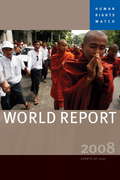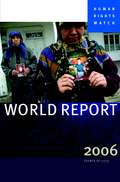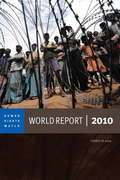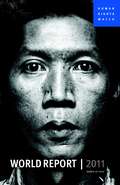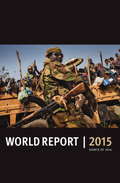Special Collections
Human Rights Collection
- Table View
- List View
A Violent Education
by Human Rights WatchIn this 125-page report, the ACLU and Human Rights Watch found that in Texas and Mississippi children ranging in age from 3 to 19 years old are routinely physically punished for minor infractions such as chewing gum, talking back to a teacher, or violating the dress code, as well as for more serious transgressions such as fighting. Corporal punishment, legal in 21 states, typically takes the form of “paddling,” during which an administrator or teacher hits a child repeatedly on the buttocks with a long wooden board. The report shows that, as a result of paddling, many children are left injured, degraded, and disengaged from school.
Violent Response
by Human Rights WatchSince the government of Saddam Hussein was overthrown in mid-April, U.S. forces have encountered hostility in some quarters, and increasing armed resistance from individuals or small groups, particularly in central Iraq. One site of continued armed clashes is the mid-sized desert city of al-Falluja, sixty kilometers (thirty-five miles) west of Baghdad. Al-Falluja had been spared the ground war in March and April 2003, but had come under air bombardment. Local resentment was evident from the day U.S. soldiers from the 82nd Airborne Division arrived in al-Falluja, on April 23. The key turning point came five days later, on April 28, when a demonstration calling for the soldiers to leave turned violent. According to protesters, U.S. soldiers fired on them without provocation, killing seventeen people and wounding more than seventy. According to the U.S. military, the soldiers returned precision fire on gunmen in the crowd who were shooting at them.
The Warri Crisis
by Human Rights WatchConflict in Nigeria's Delta State during 2003 has led to the killing of hundreds of people, the displacement of thousands, and the destruction of hundreds of properties. Among the dead are probably dozens killed by the security forces. Although the violence has both ethnic and political dimensions, it is essentially a fight over money. In Nigeria, control of government often represents virtually unaudited control over resources. Delta State, which produces 40 percent of Nigeria's oil and receives 13 percent of the revenue from production in the state, has a particularly controversial division of political and government positions and structures, over which representatives of different ethnic groups are struggling. The wholly fraudulent nature of the 2003 state and federal elections in Delta State, as in 1999, means that there is little hope of changing political structures by democratic means, and elections become a focus for violence. In addition, the warring factions are fighting for control of the theft of crude oil, siphoned from pipes owned by the joint ventures that operate Nigeria's oil industry, known as "illegal oil bunkering." Illegally bunkered oil accounts for perhaps 10 percent of Nigeria's oil production, and those who sell the stolen oil, who have low capital costs, make enormous profits from this trade. Both politicians and those who head the illegal bunkering rackets (sometimes the same people) have armed youth militia to ensure their reelection or defend their operations. Among the other factors contributing to the conflict are the widespread availability of small arms, and ongoing impunity for abuses by all sides, including the security forces, since the first round of serious fighting in Delta State in 1997. Finally, the corruption and mismanagement in government that has left the region from which Nigeria derives its wealth poor and underdeveloped, has created a large class of young men who have no hope of legitimate work that would fulfill their ambitions, and are easily recruited into violence.
“We are Not the Enemy”
by Human Rights WatchPublic officials tried vigorously to contain a wave of hate crimes in the United States after September 11, Human Rights Watch said in a report released today. Nevertheless, anti-Muslim hate crimes in the United States rose 1700 percent during 2001. The report documents anti-Arab and anti-Muslim violence and the local, state and federal response to it. The forty-one page report, “We Are Not the Enemy,” draws on research with police, prosecutors, community activists, and victims of hate crimes in six cities (Seattle, Washington; Dearborn, Michigan; Chicago, Illinois; Los Angeles, California; Phoenix, Arizona; and New York, New York) to review steps taken by government officials to prevent and prosecute hate crimes after the September 11 attacks in New York and Washington, D.C. The report also examines the scope and extent of these hate crimes, which included murder, assault, arson, and vandalism. “Government officials didn’t sit on their hands while Muslims and Arabs were attacked after September 11,” said Amardeep Singh, author of the report and U.S. Program researcher at Human Rights Watch. “But law enforcement and other government agencies should have been better prepared for this kind of onslaught.”
Without Remedy
by Human Rights WatchThe massive pulp and paper industry located in Riau province on the island of Sumatra, Indonesia has received increasing international attention. The industry is economically imperiled - with debts of more than U.S.$20 billion - and is decimating wide swathes of Sumatra's lowland tropical forests, some of the most biologically diverse and formerly among the most extensive in the world. Yet even in the current climate of increasing international attention to corporate responsibility, relatively little attention has been paid to persistent violations of the rights of local communities who live within Riau's forest concessions, peoples whose livelihood has depended on the forests for generations.
Witness to Abuse
by Human Rights WatchThe 101-page report, documents how the Justice Department denied the witnesses fundamental due process safeguards. Many were not informed of the reason for their arrest, allowed immediate access to a lawyer, nor permitted to see the evidence used against them. The Justice Department evaded fundamental protections for the suspects and the legal requirements for arrested witnesses. Their court proceedings were conducted behind closed doors, and all the court documents were sealed.
World Report 2006
by Human Rights WatchHuman Rights Watch is increasingly recognized as the world's leader in building a stronger awareness for human rights. Their annual World Report is the most probing review of human rights developments available anywhere. Written in straightforward, non-technical language, Human Rights Watch World Report prioritizes events in the most affected countries during the previous year. The backbone of the report consists of a series of concise overviews of the most pressing human rights issues in countries from Afghanistan to Zimbabwe, with particular focus on the role--positive or negative--played in each country by key domestic and international figures. Highly anticipated and widely publicized by the U.S. and international press every year, the World Report is an invaluable resource for journalists, diplomats, and all citizens of the world.
World Report 2007
by Human Rights WatchHuman Rights Watch is increasingly recognized as the world's leader in building a stronger awareness for human rights. Their annual World Report is the most probing review of human rights developments available anywhere. Written in straightforward, non-technical language, Human Rights Watch World Report prioritizes events in the most affected countries during the previous year. The backbone of the report consists of a series of concise overviews of the most pressing human rights issues in countries from Afghanistan to Zimbabwe, with particular focus on the role--positive or negative--played in each country by key domestic and international figures. Highly anticipated and widely publicized by the U.S. and international press every year, the World Report is an invaluable resource for journalists, diplomats, and all citizens of the world.
World Report 2009
by Human Rights WatchHuman Rights Watch is increasingly recognized as the world's leader in building a stronger awareness for human rights. Their annual World Report is the most probing review of human rights developments available anywhere. Written in straightforward, non-technical language, Human Rights Watch World Report prioritizes events in the most affected countries during the previous year. The backbone of the report consists of a series of concise overviews of the most pressing human rights issues in countries from Afghanistan to Zimbabwe, with particular focus on the role--positive or negative--played in each country by key domestic and international figures. Highly anticipated and widely publicized by the U.S. and international press every year, the World Report is an invaluable resource for journalists, diplomats, and all citizens of the world.
World Report 2011
by Human Rights WatchHuman Rights Watch is increasingly recognized as the world's leader in building a stronger awareness for human rights. Their annual World Report is the most probing review of human rights developments available anywhere. Written in straightforward, non-technical language, Human Rights Watch World Report prioritizes events in the most affected countries during the previous year. The backbone of the report consists of a series of concise overviews of the most pressing human rights issues in countries from Afghanistan to Zimbabwe, with particular focus on the role--positive or negative--played in each country by key domestic and international figures. Highly anticipated and widely publicized by the U.S. and international press every year, the World Report is an invaluable resource for journalists, diplomats, and all citizens of the world.
World Report 2015
by Human Rights WatchThe human rights records of more than ninety countries and territories is put into perspective in Human Rights Watch's signature yearly report, which, in the 2014 volume, highlighted the armed conflict in Syria, international drug reform, drones and electronic mass surveillance, and more, and also featured photo essays of child marriage in South Sudan, the cost of the Sochi Winter Olympics in Russia, and religious fighting in Central African Republic. Reflecting extensive investigative work undertaken in 2014 by Human Rights Watch staff, in close partnership with domestic human rights activists, the annual World Report 2015 is an invaluable resource for journalists, diplomats, and citizens, and is a must-read for anyone interested in the fight to protect human rights in every corner of the globe.From the Trade Paperback edition.

